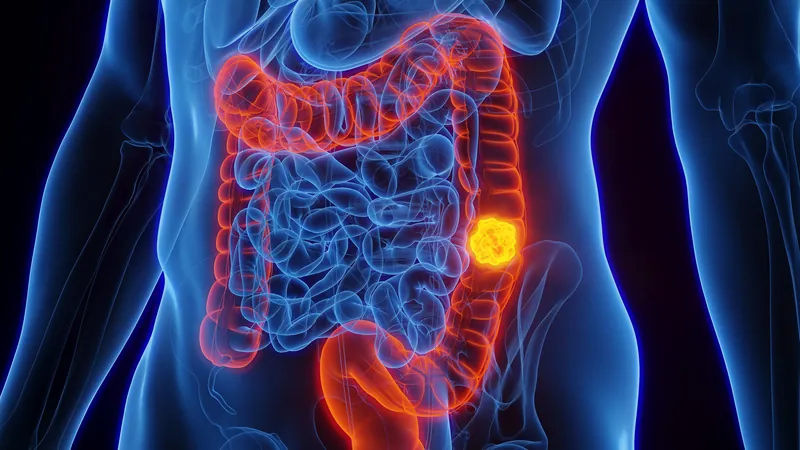
Shocking Findings Reveal Visceral Protein Ratios as Key Indicators for Survival in Colon Cancer Patients!
2024-11-05
Author: John Tan
Introduction
A groundbreaking study published in the journal Heliyon has unveiled a critical link between visceral protein ratios and patient outcomes in colon cancer, which remains the second leading cause of cancer-related deaths worldwide. Researchers have found that lower levels of the albumin-globulin ratio (AGR), prealbumin-globulin ratio (PGR), and albumin-prealbumin-globulin ratio (APGR) closely correlate with poorer overall survival (OS) and progression-free survival (PFS) in colon cancer patients.
Background
Colon cancer, being the most prevalent type of colorectal cancer (CRC), often presents diagnostic challenges as symptoms can be vague and easily overlooked, particularly in adults aged 45 and older whose incidences are notably on the rise. Understanding prognostic indicators is crucial for improving the five-year survival rates of those affected. The visceral proteins—albumin, globulin, and prealbumin—play significant roles in various pathological processes. This research aimed to explore different combinations of these proteins in hopes of refining stratification and decision-making for colorectal cancer treatment.
Study Design and Participants
The study included 705 patients who underwent surgical resection for colon cancer at the First Affiliated Hospital of Guangxi Medical University. Participants were selected based on stringent criteria, including comprehensive serological and clinicopathologic data, which excluded those with severe liver and kidney dysfunction, unclear tumor locations, or prior neoadjuvant treatments. Each patient's demographic information and tumor characteristics were meticulously recorded, including tumor location, size, histological type, and grade.
Results
The patient cohort had an average age of 58.1 years, with 62.8% being male. Alarmingly, nearly half (48.7%) had advanced stage III/IV disease, and the recurrence rate stood at 25.8%, with 39.7% of participants succumbing to the disease. The study measured key blood proteins before surgery, discovering median levels of albumin (38.0 g/L), globulin (26.4 g/L), and prealbumin (188.7 mg/L).
Findings
The findings were striking. The median AGR was recorded at 1.43, with lower values observed in patients experiencing cancer recurrence (1.37) and those who died (1.37), compared to their counterparts (1.45 and 1.49, respectively). Similarly, the PGR and APGR medians were lower among those with recurrence and deaths, highlighting the prognostic significance of these ratios. Notably, patients with low AGR, PGR, and APGR faced markedly diminished survival rates—with PFS rates dropping from 73.6% to 48.7% and OS rates from 70.5% to 47.6% when comparing high to low protein ratios.
Correlations and Other Factors
Additionally, advanced age, larger tumor sizes, late-stage metastasis, and elevated carcinoembryonic antigen levels contributed to the decreasing visceral protein ratios, correlating them with increasing recurrence and mortality rates. AGR emerged as a standout predictor for recurrence risk (OR, 0.779), illustrating its potential utility in clinical settings.
Limitations and Future Directions
Yet, caution is warranted; this study has its limitations, including being conducted at a single center and relying on retrospective data analysis, which may introduce bias. With further expansive studies on visceral protein markers necessary, these findings mark a significant step forward in predicting outcomes for colon cancer patients.
Conclusion
The researchers advocate for the use of lower levels of AGR, PGR, and APGR as valuable prognostic tools in clinical practice. APGR, in particular, showed remarkable potential for forecasting prognosis, paving the way for more personalized treatment approaches in colon cancer care. This research certainly opens the door to innovative methods that could revolutionize how we manage and treat colon cancer in the future. Stay tuned for more updates on this vital topic!




 Brasil (PT)
Brasil (PT)
 Canada (EN)
Canada (EN)
 Chile (ES)
Chile (ES)
 España (ES)
España (ES)
 France (FR)
France (FR)
 Hong Kong (EN)
Hong Kong (EN)
 Italia (IT)
Italia (IT)
 日本 (JA)
日本 (JA)
 Magyarország (HU)
Magyarország (HU)
 Norge (NO)
Norge (NO)
 Polska (PL)
Polska (PL)
 Schweiz (DE)
Schweiz (DE)
 Singapore (EN)
Singapore (EN)
 Sverige (SV)
Sverige (SV)
 Suomi (FI)
Suomi (FI)
 Türkiye (TR)
Türkiye (TR)